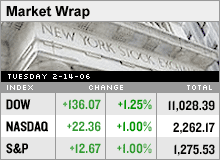|
Dow closes above 11,000
Blue-chip gauge hits highest level in a month on falling crude prices, strong retail sales.
NEW YORK (CNNMoney.com) - Stocks surged Tuesday, with the Dow closing above 11,000 for the first time in a month, as lower oil prices and a jump in retail sales helped quell worries about a slowdown in consumer spending. The Dow Jones industrial average (up 136.07 to 11,028.39, Charts) surged about 1.3 percent, closing above 11,000 for the first time since Jan. 11, when it finished at 11,043.44.
The Nasdaq composite (up 22.36 to 2,262.17, Charts) and the broader Standard & Poor's 500 (up 12.67 to 1,275.53, Charts) each climbed 1 percent. The focus Wednesday turns to interest rates and the economy, with Federal Reserve Chairman Ben Bernanke due to testify before Congress. It will be his first public testimony as the new head of the central bank since replacing Alan Greenspan two weeks ago. The new Fed chief is not expected to say anything so surprising tomorrow as to rattle the markets. Nonetheless, the fact that Bernanke represents something of an unknown after Greenspan's 18-1/2 year term has caused some jitters among investors, and his comments will be closely dissected. At the Jan. 31 Fed policy meeting, the last under Greenspan, the central bank opted to boost a key short-term rate a quarter-percentage point to 4.5 percent, the 14th consecutive hike since late June 2004. The statement also left the door open for further rate hikes. Wednesday also brings reads on industrial production and capacity utilization for January, the February NY Empire State index and the weekly oil inventories report. Falling oil and the belief that stocks are undervalued helped fuel Tuesday's rally, said Tony Dwyer, an equity market analyst at FTN Midwest Research. U.S. light crude oil for March delivery sank $1.67, a drop of nearly 3 percent, to $59.57 a barrel on the New York Mercantile Exchange. Dwyer also said the morning's strong retail numbers added to the excitement and helped dispel the notion that higher energy prices, interest rates or a housing bubble will hit personal spending. "The whole consumer Armageddon argument against equities is wrong," he said. "Obviously, it's going to slow it down, but it's not the end of the world." Tuesday's market movers
Gains were broad-based, with 28 out of 30 Dow components rising. Retailers made some of the biggest gains, with Home Depot (up $1.43 to $41.13, Research) jumping 3.6 percent and Wal-Mart (up $0.94 to $46.45, Research) up around 2.1 percent on the solid sales numbers. Economically-sensitive issues rebounded, including aluminum maker Alcoa (up $1.13 to $31.37, Research), chemical maker DuPont (up $0.84 to $40.99, Research) and machinery makers Caterpillar (up $1.60 to $70.22, Research). And 3M (up $0.79 to $73.70, Research) climbed 1.1 percent after announcing late Monday that it was boosting its quarterly dividend to 46 cents a share and authorized the repurchasing of $2 billion in outstanding shares in 2006. Financial stocks rose, pushing the Amex Securities Broker/Dealer (up 3.56 to 215.02, Charts) index up 1.7 percent. Homebuilding stocks rebounded from Monday's selloff, with the Dow Jones Home Construction (up $16.86 to $873.76, Research) index rising nearly 2 percent. On the downside, oil stocks continued to slump as prices fell, with the Philadelphia Oil Service (Charts) sector index losing 2.8 percent. Market breadth was positive. On the New York Stock Exchange, winners beat losers by eleven to five on volume of 1.81 billion shares. On the Nasdaq, advancers topped decliners by nearly two to one on volume of 1.84 billion shares. Investors welcome strong retail sales
January retail sales jumped 2.3 percent -- the biggest gain since May 2004 -- topping economists' average forecasts, while sales excluding autos rose 2.2 percent, another surprisingly strong reading. While the retail sales report was welcomed, in other recent sessions, strong economic news has caused worries about interest rates and inflation. "We seem to go from worries about the economy slowing down to appreciating that the economy remains strong and can bounce back from slower fourth-quarter GDP growth," said Barry Hyman, equity strategist at Ehrenkrantz King Nussbaum. "At the same time, there is this increased market volatility that exaggerates these swings," Hyman added. That may have been the case Wednesday. The retail sales report could propel economic growth to a rate of at least 5 percent for the quarter, Anthony Crescenzi, an analyst at Miller Tabak & Co., said in a research note. That, he said, could cause a jump in inflation. Treasury prices fell after the retail sales report, raising the yield on the 10-year note to 4.61 percent from 4.57 percent late Monday. Bond prices and yields move in opposite directions. In currency trading, the dollar slipped against the yen and euro. COMEX gold for April delivery rose $6.80 to settle at $548.90 an ounce. _______________
Click here for the latest business news. |
| ||||||||||||||||||||||||||||||||||||||||||||||||||||||





